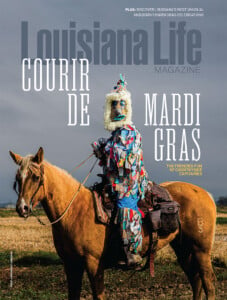Boucheries on the Bayou
From the Executive Editor's Desk

On a Saturday night in 2005, only a few weeks after Hurricane Katrina plowed through the state, there were bursts of bright red glows along the levee near the Avoyelles Parish town of Mansura.
There had not been much to celebrate lately, but on the next day the local church would be the purveyor of an honored repast in French/American country — roast pig dinners.
Those red glows were sacrifices from giant hogs each split wide open and fastened on a grid. Impressive fires dispersed smoke and, more importantly, the scent of grilled meat, through the country air. The smell of fire and meat has tempted villagers, tribespeople, and wanderers for as long as there has been civilization. Sometimes, after a tragedy, like a hurricane, the fragrancy is an assurance that civilization continues. The red glow leads the hungry to the ritual.
By the next morning the hogs will be butchered into servable slices. Through the morning, neighbors who have purchased dinner tickets will stand in line, both helping to support the church and gathering dinners — each, also including a heap of “dirty rice,” served in Styrofoam cartons.
Our cover story this issue is about wild hogs of which there are many in Louisiana. But we pause here to honor the domestic pig to which rural Louisiana has a special appreciation. Closely related to the pig roast, described above, is the boucherie. Both events begin with pigs and a fire. For boucheries though, what follows is different. Instead of being a fundraiser, a boucherie is more of a neighborhood food preparation event. Through the morning, neighbors make different products from the pig, especially sausage — including the superstars of Louisiana pork cooking — boudin and andouille. Boudin comes in two forms; the “red” (blood sausage) and the more demanded “white,” filled with ground pork and seasonings.
There is a social aspect to pork-eating gatherings. Even if it is just while standing in line, folks get to visit each other and at the boucherie, they can share a meat grinder on the way to making sausage.
In the town Mansura, the pig gets its own festival. Some place had to be the “Cochon de Lait Capital Festival of the World” and once Mansura claimed that title, no one has challenged it. Unlike other swine events, there are games and bands, but most of all there is the namesake young suckling pig which is marinated, pit-roasted, and sliced thin. Someone at the New Orleans Jazz & Heritage Festival once discovered that the combination of the roasting, marinade, and thin slices are the making of a fine poor boy. While Mansura may rule the world, Jazz Fest has made the cochon de lait, when served as a poor boy, famous. At the Fest, it is devoured by a big city crowd including international travelers who can bring memories of the dish back home.
There are other native pork products made in the river parishes between New Orleans and Baton Rouge, such as andouille and tasso. Not to be forgotten throughout the state is the “cracklin’,” or as called in French, “graton.” Convincing an outsider to sample an item made from pig skin and fat cooked in a cauldron with hot oil and then salted can be a challenge. But the undisputable argument is that when done right, cracklins taste good, combining touches of sweet meat with the crunchiness of the skin. It is not an everyday snack, but a few times a year, they are ok — I hope.
There is an old adage applied to pork that says if you “like sausage and laws you should not watch either being made.” Sausage at least has the advantage of being enhanced by a baked sweet potato on the side.
Errol Laborde, Executive Editor
Louisiana Insider
Catch up on the latest podcast episodes
 Episode 137
Episode 137
Monroe Doctrine with Mayor Friday Ellis
Friday Ellis, the first-term mayor of Monroe, talks about his city and a vision of the state from his perspective, as well as that of other City Hall colleagues. Also, hear about serious plans for AMTRAK rail service and downtown revival. Mayor Ellis’ wife Ashley also joins the conversation. The Monroe First Lady is a member of the Board of Elementary and Secondary Education. Guests: Friday and Ashley Ellis
 Episode 136
Episode 136
Robert Mann, Hey Long and LSU
Robert Mann, an historian, author, and a political consultant, talks about his book, “Kingfish U: Huey Long and LSU.” More than just telling the story about the evolution of a university, the book provides a fascinating study of the state and its politics. Guest: Robert Mann
 Episode 135
Episode 135
Perique — The “Only in Louisiana” Crop
Mike Matherne, whose family own one of the 25 perique tobacco farms, tells the story about the growth and fermentation of the plant. He talks about perique’s use as a flavorful condiment to mix with other tobaccos used in cigars and pipes. Guest: Mike Matherne

